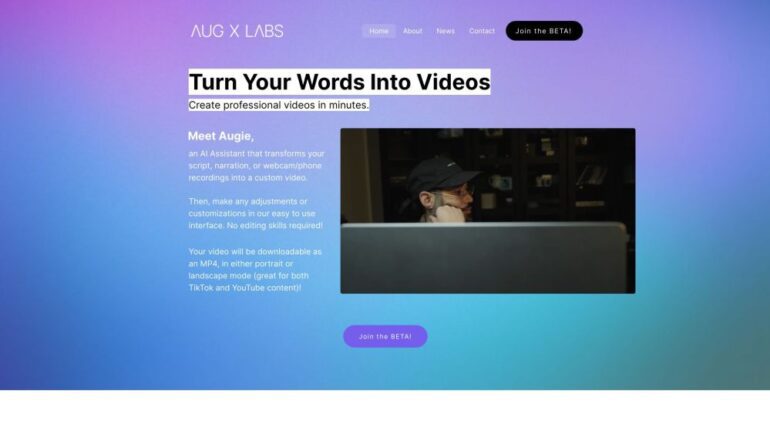TL;DR:
- Aug X introduces Augie, an AI-powered video platform with voice cloning.
- Augie enables users to clone voices for short videos, targeting marketers and social media teams.
- Users can add narration, photos, text, and music without mastering editing skills.
- Founder Jeremy Toeman cites user preference for voice cloning over recording.
- Augie users can write or upload scripts and choose from a library of voices.
- Platform offers mood-adjustable narration and visuals from Getty or AI-generated images.
- Augie’s public beta phase started in May, granting access to voice cloning.
- Future restrictions on video length and voice cloning for non-paying users anticipated.
- Augie’s voice cloning aligns with the trend of integrating AI in comprehensive services.
- Precautions taken to prevent copyright infringement and misuse of voice cloning.
- Recorded voices exclusive to individual accounts, enhancing authenticity.
- Collaboration with ElevenLabs ensures transparency in identifying AI-generated content.
Main AI News:
In a groundbreaking move, Aug X has unleashed Augie, a cutting-edge AI-driven video production platform that seamlessly incorporates an innovative voice cloning capability, eliminating the need for traditional recording studios. In collaboration with ElevenLabs, Aug X has devised a platform that empowers users to not only record their own voices but also to effortlessly clone and repurpose them for diverse short video projects. Tailored primarily to cater to the dynamic requirements of marketers and social media teams, the Augie platform offers a streamlined avenue to infuse videos with captivating narration, striking visuals, compelling text, and harmonious music, all without the necessity of mastering intricate audio and video editing techniques.
Founder and visionary Jeremy Toeman shared that the genesis of the voice cloning feature stemmed from a genuine realization: there exists a cohort of individuals who harbor reservations about speaking into microphones or undertaking the task of recording voice-overs. “You’d be taken aback by the volume of users who have enthusiastically embraced our voice cloning feature, expressing their gratitude for alleviating the pressure of recording narration,” Toeman remarked with a smile.
Within the Augie ecosystem, users can effortlessly craft their scripts or effortlessly upload them, then proceed to harness the power of prerecorded voices, either snippets of their own or selections from the extensive voice library. The selected voice persona will then eloquently deliver the script, imbuing it with the desired emotional nuances—ranging from solemnity to enthusiasm, and even a touch of the eerie—tailored precisely to the mood and essence of the video. Augie not only extends its creative arsenal with a captivating voice feature but also offers an array of visuals, including Getty-licensed photos and AI-generated imagery, seamlessly enriching the video creation process.
Toeman envisions a transformative landscape for marketing teams, enabling them to swiftly generate concise videos without the logistical complexities of booking their organization’s spokesperson for extensive studio sessions. Augie, having embarked on its public beta journey in May, currently extends access to the voice cloning feature to all users. However, Toeman revealed a possible evolution where video length and quality, as well as the allocation of cloned voices to non-subscribers, could be subject to certain limitations. These potential constraints are a response to the financial commitments associated with operating the intricate voice cloning servers in partnership with industry allies.
While voice cloning is not entirely uncharted territory—Samsung has already ventured into AI-driven voice responses for calls—the convergence of such technology into comprehensive services, as exemplified by Aug X, marks a significant milestone. In the wake of a viral sensation involving a deepfaked Drake track featuring an AI-generated rendition of the artist’s voice, pertinent discussions about copyright infringement and unauthorized utilization of likeness have resurfaced. Toeman affirms that such potential pitfalls were preemptively addressed during the development phase, reinforcing the meticulous scrutiny governing the access and utilization of the pre-recorded voice cloning feature.
Toeman underscored a salient distinction: recorded voices, distinct from those residing within the expansive Augie library, will remain exclusively accessible to individual accounts. This strategic decision demands that colleagues within the same organizational framework replicate their spokesperson’s voice, thereby fostering authenticity and safeguarding against misuse. Augie, with its commitment to maintaining quality and integrity, exclusively accepts voices recorded through live microphones, precluding attempts to manipulate the system with pre-recorded audio. The prevailing sentiment—no gaming the system with your ex’s voice on loudspeaker to simulate a conversation with a suspiciously cooperative friend—will find no success within Augie’s realm.
Augie is also diligently collaborating with its esteemed voice cloning partner, ElevenLabs, to identify and differentiate AI-generated voices and videos, thereby fostering a climate of transparency and reliability within its ecosystem.
Conclusion:
The introduction of Augie and its innovative AI-driven voice cloning capability marks a transformative shift in video production. This development responds to a growing user preference for efficient narration without traditional recording methods. Augie not only streamlines video creation but also aligns with the industry trend of integrating AI into comprehensive services. As the market gravitates toward simplified content creation and AI-driven solutions, Augie’s approach stands as a testament to the potential of AI to reshape established paradigms.

